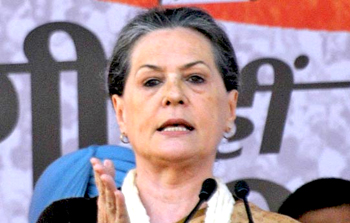Thiruvananthapuram, Aug 12: Congress president Sonia Gandhi on Tuesday attacked the Bharatiya Janata Party-led government at the Centre saying that ever since the party came to power there has been a spurt in communal violence across the country.
 Taking on the BJP, the Congress president asserted that ever since the party came to power there has been a significant rise in communal violence in many states like Uttar Pradesh and Maharashtra.
Taking on the BJP, the Congress president asserted that ever since the party came to power there has been a significant rise in communal violence in many states like Uttar Pradesh and Maharashtra.
"Communal violence took place in Uttar Pradesh and ... in Maharashtra also. These indeed are created deliberately to divide our society along religious lines, so we should do our bit to create a pluralistic society," said Gandhi, while addressing party leaders at the state Congress headquarters in the capital city.
The Congress president further hit out at the Modi government, saying the communal violence that broke out recently in Uttar Pradesh and Maharashtra was "created deliberately to divide our society".
Maintaining that such incidents are a cause of concern, Sonia said that during ten years of UPA rule there were hardly any cases of communal violence.
She also criticised the Modi government for its attitude towards the happenings at Gaza.
"In the Lok Sabha, we were unable to initiate a discussion, but in the Rajya Sabha we were able to take up the issue for discussion. We have always expressed our solidarity with the Palestinians. At the moment, the guns there have fallen silent," said Sonia.
In the last few months Uttar Pradesh has witnessed several cases of communal violence leading to the loss of many lives.
The BJP under the leadership of Narendra Modi registrered a speactacular peroformance ion the Gneeral Elections and won 71 of the 80 Lok Sabha seats in Uttar Pradesh.
While the BJP won 71 Lok Sabha seats in Uttar Pradesh, its ally Apna Dal took two. The Samajwadi Party claimed just five seats. The Congress bagged the remaining two.





Comments
Add new comment